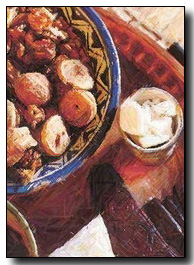Friday Abstinence
- GRACE MACKINNON
Dear Grace, I would like to know what is behind the abstinence of meat on Fridays of Lent. Being a Catholic, I was asked that question and I was unable to answer it. Please answer this in your column during Lent if possible.
 |
Abstinence (depriving oneself of certain foods) has been a part of the history of man since the beginning, when God said to the first man Adam that he should not eat from the tree of the knowledge of good and evil, lest he die (Genesis 2:16). It is generally understood that this was so that man would always recognize his dependence on his Creator. But Adam disobeyed God and this sin was transmitted to all his descendents. Penance thus became necessary in order to make up to God for the transgression against Him. The Hebrews, therefore, developed a traditio that would satisfy this necessity for penance.
To the Jewish people, laws regarding fasting pertained to the amount of food to be eaten, while laws regarding abstinence pertained to the quality or kind of food. Their many difficult times and hardships led them to take on the burden of fasting and abstinence because they believed that it was pleasing to God and would bring them closer to Him. Abstinence from meat appears to be grounded in the directive to Noah by God that "only flesh with its lifeblood still in it you shall not eat" (Genesis 9:4). The people of ancient times regarded blood as the seat of life and therefore sacred. Thus, abstaining from eating the meat of red-blooded animals became a law to be observed on certain days of penance.
We know of course that Jesus prepared for His public ministry by fasting for forty days and nights in the desert. Although, during His time with them, He did not give specific directions as to how His followers were to fast afte His ascension to the Father, it is quite evident that fasting and abstinence were faithfully assumed by the first Christians (Acts 13:3, 14:23) and that they also practiced the abstinence of meat, a prohibition of the Mosaic Law (Acts 15: 20, 29).
From the beginning of Christianity, Friday has always been recognized as a day of fasting and abstinence in memory of the fact that the Lord Jesus Christ suffered and died on that day of the week. The manner in which it has been observed, however, has undergone some change. In current church practice in the United States, all those fourteen years of age and above are bound to refrain from eating meat on all those days prescribed as "penitential" - Ash Wednesday, Good Friday, and the Fridays of Lent.
In a statement, titled "Penitential Practices for Today's Catholics," the Committee on Pastoral Practices of the National Conference of Catholic Bishops stated the following: "Recalling our Lord's Passion and death onGood Friday, we hold all Fridays to have special significance. Jesus' self-denial and self-offering invite us to enter freely into his experience by forgoing food, bearing humiliations, and forgiving those who injure us. Through the grace of the Holy Spirit, the principal agent of all spiritual transformation, this can be done-and done with a spirit of quiet joy. For Christians, suffering and joy are not incompatible."
So, you see, you can tell your friend that when we deny ourselves meat on the Fridays of Lent, we are doing something that is rooted in Scripture and the history of the Christian Church. We join Christ on His journey to Jerusalem and say no to ourselves as He did. Not eating meat on Friday is but a small thing when compared to the sacrifice He made by laying down His life willingly so that we might live.
 This is J. Fraser Field, Founder of CERC. I hope you appreciated this piece. We curate these articles especially for believers like you.
This is J. Fraser Field, Founder of CERC. I hope you appreciated this piece. We curate these articles especially for believers like you.
Please show your appreciation by making a $3 donation. CERC is entirely reader supported.

Acknowledgement
Grace MacKinnon. "Friday Abstinence." (March, 2003).
Reprinted with permission of Gace MacKinnon.
The Author
Grace MacKinnon is a syndicated columnist and public speaker on Catholic doctrine. She is the author of Dear Grace: Answers to Questions About the Faith published by Our Sunday Visitor. Order online by e-mail at osvbooksosv.com or call 1-800-348-2440.
Readers are welcome to submit questions about the Catholic faith to: Grace MacKinnon, 1234 Russell Drive #103, Brownsville, Texas 78520. Questions also may be sent by e-mail to: grace@deargrace.com.
You may visit Grace online at www.DearGrace.com.


